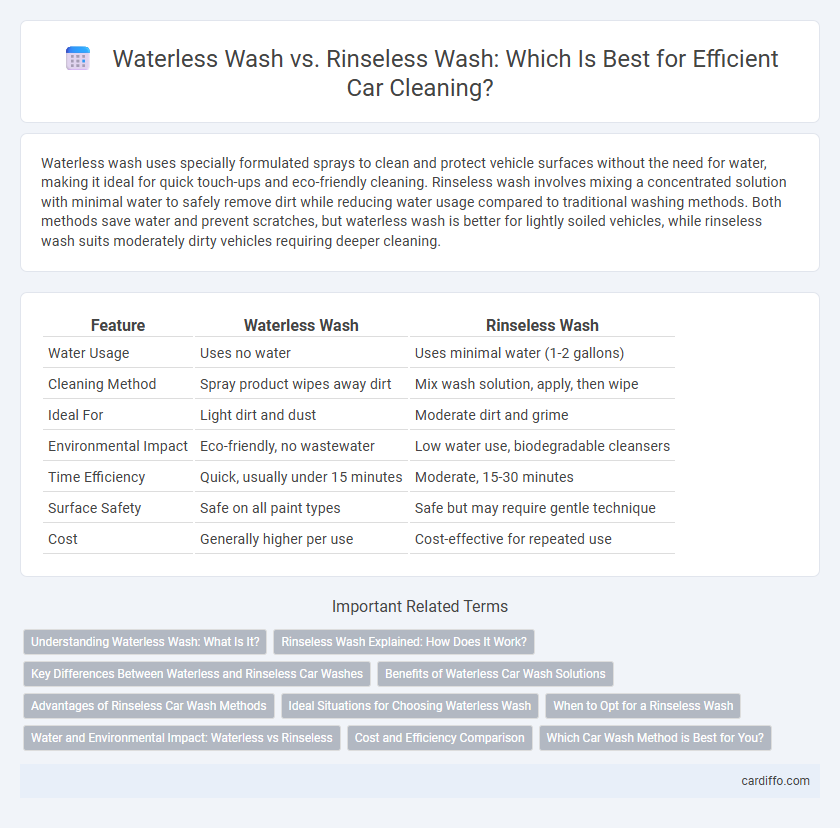Waterless wash uses specially formulated sprays to clean and protect vehicle surfaces without the need for water, making it ideal for quick touch-ups and eco-friendly cleaning. Rinseless wash involves mixing a concentrated solution with minimal water to safely remove dirt while reducing water usage compared to traditional washing methods. Both methods save water and prevent scratches, but waterless wash is better for lightly soiled vehicles, while rinseless wash suits moderately dirty vehicles requiring deeper cleaning.
Table of Comparison
| Feature | Waterless Wash | Rinseless Wash |
|---|---|---|
| Water Usage | Uses no water | Uses minimal water (1-2 gallons) |
| Cleaning Method | Spray product wipes away dirt | Mix wash solution, apply, then wipe |
| Ideal For | Light dirt and dust | Moderate dirt and grime |
| Environmental Impact | Eco-friendly, no wastewater | Low water use, biodegradable cleansers |
| Time Efficiency | Quick, usually under 15 minutes | Moderate, 15-30 minutes |
| Surface Safety | Safe on all paint types | Safe but may require gentle technique |
| Cost | Generally higher per use | Cost-effective for repeated use |
Understanding Waterless Wash: What Is It?
Waterless wash is a cleaning method that uses specially formulated sprays or foam to lift dirt and grime without the need for water rinsing. It relies on advanced polymers and lubricants to encapsulate contaminants, preventing surface scratches during the wipe-down process. This technique is ideal for conserving water and maintaining vehicle cleanliness in areas with water restrictions or limited access to hoses.
Rinseless Wash Explained: How Does It Work?
Rinseless wash is a water-efficient cleaning method that uses a specialized blend of surfactants and lubricants to encapsulate dirt particles, allowing them to be safely wiped away without the need for rinsing. This technique minimizes water usage while effectively removing contaminants, protecting automotive paint and surfaces from scratches caused by traditional washing. By combining concentrated cleaning agents with microfiber towels, rinseless wash delivers a thorough cleaning process ideal for areas with water restrictions or eco-conscious practices.
Key Differences Between Waterless and Rinseless Car Washes
Waterless car washes use specially formulated sprays that dissolve dirt and grime, allowing you to wipe the surface clean without any water, making them ideal for quick touch-ups and areas with water restrictions. Rinseless car washes, on the other hand, require minimal water mixed with a concentrated solution that lifts dirt off the vehicle, reducing water usage by up to 90% compared to traditional washing while still providing a thorough clean. Key differences include the amount of water used, the cleaning mechanism, and suitability for varying levels of dirt and grime on the vehicle's surface.
Benefits of Waterless Car Wash Solutions
Waterless car wash solutions offer significant water conservation benefits by reducing consumption by up to 90% compared to traditional methods, making them eco-friendly alternatives. These products use advanced lubricants and cleaning agents that lift dirt without scratching surfaces, preserving the vehicle's paint and finish. Ideal for urban environments or areas with water restrictions, waterless washes provide convenience and efficiency while maintaining a high-quality clean.
Advantages of Rinseless Car Wash Methods
Rinseless car wash methods offer significant advantages including water conservation by using minimal water compared to traditional washing, reducing environmental impact. They provide efficient cleaning with specially formulated solutions that safely encapsulate dirt and grime, minimizing the risk of scratches and swirl marks on vehicle paint. This method saves time and effort, making it ideal for locations with water restrictions or where quick, effective car cleaning is essential.
Ideal Situations for Choosing Waterless Wash
Waterless wash is ideal for quick, light cleaning tasks when vehicles have minimal dirt and dust buildup, and water access is limited or restricted, such as in urban settings or during drought conditions. It provides an efficient solution for maintaining a clean surface without the mess or environmental impact of rinsing, making it suitable for apartment dwellers or commercial fleets with frequent touch-ups. This method conserves water while ensuring paint protection through lubricants and cleansing agents designed to prevent scratching.
When to Opt for a Rinseless Wash
Rinseless wash is ideal when water conservation is a priority but some dirt and grime need removal without the mess of a traditional wash. This method uses minimal water combined with a specialized cleaning solution that encapsulates contaminants, allowing for effective cleaning and quick drying. Opt for rinseless wash on moderately dirty vehicles or delicate surfaces where water spots and residue must be avoided.
Water and Environmental Impact: Waterless vs Rinseless
Waterless wash systems use minimal to no water, significantly reducing water consumption compared to traditional washing methods, which is crucial in water-scarce regions. Rinseless wash techniques utilize a mixture of water and specialized soaps that require just a small rinse, cutting water use by up to 80% while still achieving effective cleaning. Both methods offer environmentally friendly alternatives by lowering water waste and decreasing runoff pollution, but waterless wash provides the greatest water conservation benefit.
Cost and Efficiency Comparison
Waterless wash products typically cost more per use but save time by eliminating the need for water, making them ideal for quick, efficient cleaning with minimal waste. Rinseless wash solutions often require dilution and multiple rinse steps, resulting in moderate water usage and lower product cost per application, offering a balance between cost-efficiency and environmental impact. Choosing between waterless and rinseless washes depends on specific cleaning demands, budget constraints, and efficiency priorities.
Which Car Wash Method is Best for You?
Waterless wash uses a specialized formula to lift dirt and grime without water, ideal for quick clean-ups and locations with water restrictions. Rinseless wash combines a small amount of water with cleaning agents to remove dirt more thoroughly, making it suitable for moderately dirty vehicles and conserving water compared to traditional washing. Choose waterless wash for convenience and minimal water use, or rinseless wash for deeper cleaning and eco-friendly water efficiency.
Waterless Wash vs Rinseless Wash Infographic

 cardiffo.com
cardiffo.com